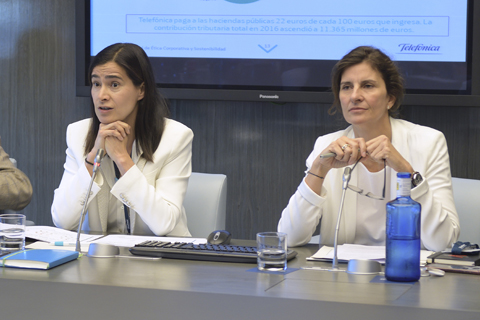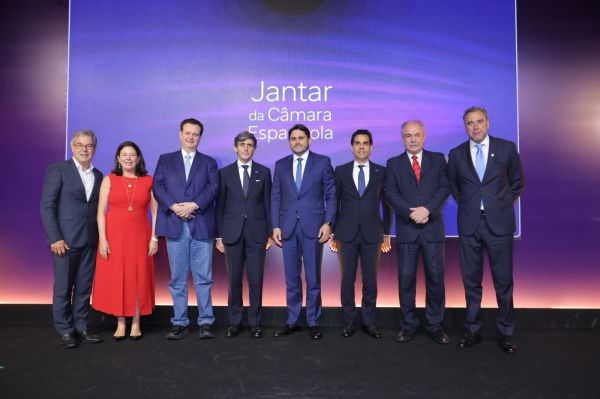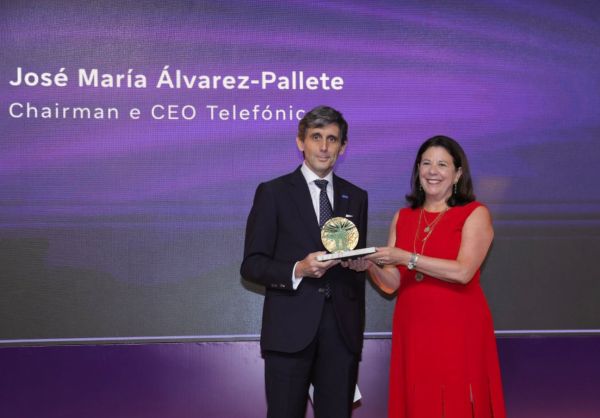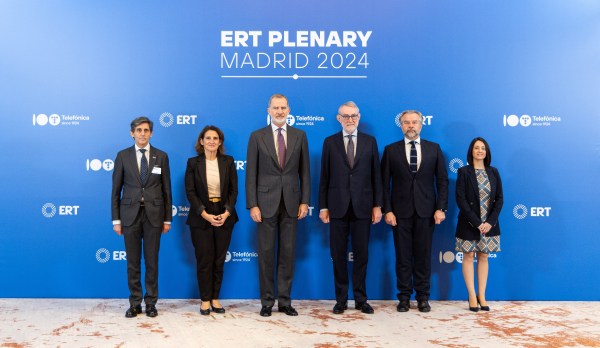- 50% of the variable remuneration of Telefónica’s employees is directly related to different customer metrics, the priority of the company, which stands at number one within the sector in the Customer Satisfaction Index in 10 of its 17 markets.
- The total number of suppliers which worked with Telefónica throughout 2016 grew slightly to 12,847, with an awarded volume totalling 26,063 million euros, of which 82% was awarded to local suppliers.
- An increasingly sustainable company: 43.6% of electricity consumption in 2016 came from renewable sources and 94% of the waste generated was recycled.
Madrid, 7 June 2017.– Today in Madrid, Laura Abasolo, Director of Planning, Budgets and Control at Telefónica, and Elena Valderrábano, Director of Corporate Ethics and Sustainability, presented the company’s Integrated Report corresponding to 2016, which includes the most relevant parameters for its strategy in all the countries in which it operates, as well as the challenges for 2017.
For the second successive year Telefónica has chosen this model of reporting to the market, which encompasses a joint strategic vision with cohesiveness between financial and non-financial aspects, enabling better understanding of the company’s entire ecosystem.
Elena Valderrábano reviewed the major trends and challenges that society as a whole will have to face in the short term: demographic growth and urban development, customer empowerment, the reinvention of the labour world, the scarcity of resources and climate change.
Meanwhile, the explosion of data, the speed and ubiquity of connectivity and the improvements in computing efficiency are leading us to a new technological paradigm which could even trigger a new growth cycle. At the same time, these advances are generating social challenges which need to be addressed – data privacy and security, potential social inequalities, ethical dilemmas, employment instability and so on. The telecommunications sector is at the centre of this revolution, as a facilitator of profound changes in the economy and society, chiefly linked to the irruption of artificial intelligence.
Telefónica has created a Sustainable Business Advisory Panel, made up of experts from different fields, whose purpose is to analyse the impact of all the above trends, in such a way that the company can better understand the expectations of customers, employees, suppliers, investors and society in general.
These challenges, as José María Álvarez-Pallete, Chairman and President of Telefónica, explains in the introduction to the Integrated Report, “can also provide an opportunity to make a more sustainable digital society, if we do so in accordance with our values. We want to give our clients the opportunity to choose the products and services which will help them to improve their lives in an integrated, transparent and committed manner.”
“Our goal is to put technology at the service of people, giving customers control over their digital lives,” declares Álvarez-Pallete. “In relation to the inequality which may be generated by the new technologies, we want to promote and ensure access to them, giving our customers and society in general, the opportunity to choose the most advanced technology and the most innovative services in a secure and high-quality fashion”.
Main magnitudes in 2016
- CUSTOMERS, THE PRIORITY
- The priority for Telefónica is for the progress it makes to benefit its customers. For this reason, the variable remuneration of the workforce is 50% linked to customer metrics, regardless of the area in which the professionals perform their work.
- Digitisation, which continued to move forward in 2016 and now covers 49% of the company’s processes, allows users to interact more easily with Telefónica, switching without any problems from one service channel to another.
- 2016 also saw the birth of LUCA, the unit specializing in Big Data, which will foster the digital transformation of our customers, enabling organizations to accelerate their journey towards Big Data by means of data engineering and business insights.
- The above is possible without neglecting the basics: excellent connectivity with the best network, honest service and customer care which goes beyond the simple resolution of complaints. For this purpose, Telefónica not only invests in the deployment of networks but also develops innovative solutions allowing it to bring the benefits of the information society to everyone, regardless of their location, economic situation or any disability.
- Therefore, in 2016, the company launched Movistar+ 5S, a free service enabling people with sensory disabilities to access series and films on the Movistar+ television platform via three accessibility systems: audio description, subtitling and sign language. This project forms part of the global pledge to be a fully accessible company.
- Customers need to use the services with confidence and a sense of security and peace of mind for the entire family. Hence the launch of Dialogando, a free platform which addresses the responsible use of technologies in matters such as digital identity, privacy, cyberbullying, video games, education, driving and so on.
- A GENERATOR OF WEALTH, EMPLOYMENT AND PROGRESS
- Telefónica is one of the most important driving forces of economic progress in the communities in which it operates. In 2016 it increased its contribution to the GDP of the group of countries in which it operates by 53,244 million euros, a figure which accounts for 0.6% of the total wealth generated within them as a whole. In the countries with the highest turnover, such as Spain, the above figure rises to 1.8%.
- The company boosts the economies of these communities, both indirectly and as a result of its activity’s capacity to multiply wealth. Thus, for each euro of the GDP directly created by Telefónica in 2016, it generated an additional €1.14 in an indirect and induced manner, as a result of its expenses and the investments it made. In this regard, the total contribution to the GDP of these countries stands at 3.50 euros for each euro it generates.
- As for taxation, Telefónica pays the tax authorities 22 euros for every 100 euros in revenues. Telefónica’s tax contribution totalled 11,365 million euros in 2016.
- One fundamental factor for the progress of society is the creation of employment, and Telefónica also presents itself as a significant generator of labour, as demonstrated by the fact that, in 2016, it generated 1,278,194 jobs (direct, indirect and induced), given that, for each person added to its workforce, it created a further 7 jobs.
- 12,847 suppliers worked with Telefónica in 2016, with an awarded volume totalling 26,063 million euros, of which 82% was awarded to local suppliers.
- Telefónica has 1,856 different suppliers in Spain and 91% of the purchases it makes are from local companies.
- THE BEST TALENT
- Within the digital environment, the concept of the team is redefined: the talent lies inside and outside companies. Telefónica is therefore giving more and more importance to intrapreneurship, the training of its employees, flexibility and diversity, to its suppliers, with whom it is establishing a partnership model, and to open innovation.
- In 2016, the company invested 39.3 million euros in training, representing 4.9 million hours, with an increase of more than 25% in the average amount of training per employee. In 2016, Universitas Telefónica, our corporate university, trained 2,005 executives on its campus in Barcelona, thanks to its in-situ leadership and strategy programmes.
- The Board of Directors defined diversity as the main source of talent, setting two priorities: to narrow the gender gap for women in positions of responsibility within the company and to attract young talent – 20% of the workforce is currently under 30 years old-. A Diversity Council, created in 2016 and made up of top-level managers, is responsible for promoting the initiatives necessary for moving forward in this field.
- In 2016 Telefónica approved a new Supply Chain Sustainability Policy, which included aspects related to anti-corruption and conflicts of interest, the privacy and confidentiality of information, etc., and reinforced others such as social issues (human trafficking) and environmental matters (waste, hazardous substances, consumption of materials, etc.) as minimum criteria to be met by suppliers.
- In order to ensure compliance of the above, even at the second level of its supply chain, the company reinforced its annual audits by joining the JAC (Joint Audit Cooperation) sectoral initiative, which performed 51 in-situ factory audits on critical suppliers.
- The cooperation with suppliers enabling them to become true partners took the form, for example, of projects related to energy efficiency and the self-generation of renewable energies, replacing product per service and thereby achieving greater efficiency.
- 18,000 entrepreneurs conduct their connected projects by means of the Telefónica Open Future digital tool, which has helped accelerate more than 1,500 startups in its academies and crowdworking spaces and invested in more than 700 startups. With 85 public and private partners, the platform has pledged investment totalling 445 million euros with its partners.
- In 2016 Telefónica’s expenditure on R&D&I totalled 6,568 million euros and, once again, it was the world’s fourth largest telco in terms of investment in innovation and the second in Europe, according to the 2016 EU Industrial R&D Investment Scoreboard report published by the European Commission. The company registered 27 new patent applications.
- SUSTAINABLE NETWORK
- Connectivity is one of the main driving forces of the digital transformation. Beyond the sustained efforts for investment in network deployment, by means of technological innovation and new business models, Telefónica is developing affordable and accessible connectivity solutions so as to ensure that everybody has access to the benefits of digitization.
- Since 2012, Telefónica has invested 38,000 million euros (9,000 in 2016 alone) in the development of its fixed and mobile networks, chiefly ultra-fast and new-generation networks, and in the improvement of capacity and coverage, enabling it to increase its traffic by up to 49%.
- In 2016 the company doubled its use of renewable electricity to a global figure of 44% (79% in Spain), thereby accelerating the fulfilment of its objectives: to achieve 50% by 2020 and 100% by 2030.
- Telefónica’s goal is to have the best network, allowing it to offer excellent connectivity in terms of energy and carbon efficiency.
- Telefónica’s energy consumption in 2016, mainly due to its network, stood at 6,740 GWh, 2.2% less than in 2015, despite the 50% increase in traffic. Thus, in 2016 it reduced its energy consumption of traffic (energy intensity) by 34%. This was due to the Energy Efficiency Plan, which conducted 130 specific projects generating savings amounting to 22 million euros. In addition, it reduced its CO2 emissions by 26%.
- In terms of mobile networks, it achieved historic levels of 4G coverage, recording 96% in Spain, 95% in the United Kingdom, 79% in Germany, 60% in Brazil and 49% in Latin America. In 2016 accesses totalled 350 million, of which 147.2 million corresponded to smart phones, representing an increase of 17% in comparison with 2015, with an overall penetration of 57%. LTE customers totalled 66.3 million (1.8 times more than in the previous year).
- As for fixed networks, in 2016 Telefónica reached 39 million households with fibre and cable networks in Spain, Brazil and Latin America and 9.2 million fibre + VDSL customers. In addition, fibre optic and cable customers increased by 24% compared with 2015, accounting for 43% of total fixed broadband accesses. As for pay TV, the company achieved 8.3 million accesses throughout the past year.
- COMMITTED TO THE CIRCULAR LOW-CARBON ECONOMY
- Telefónica reduced its CO2 emissions by 26% in 2016 as part of its commitment to climate change and its aim is to reduce them by 30% by 2020 in order to support the Paris Agreement.
- With its IoT and Big Data services, Telefónica also helped companies and cities to reduce emissions by improving waste management (Smart Waste) and resources such as energy and water. Thus, they optimize their consumption and improve aspects such as traffic and air quality.
- Telefónica’s IoT services to improve the mobility and energy efficiency of its customers led to more than 50 million euros in revenues in 2016 and managed to eliminate 229,314 tonnes of CO2.
- Telefónica generated about 23,507 tonnes of waste in 2016, a fall of 12%, of which 94% were recycled. The digitization of its waste management system will enable it to further reduce its environmental impact by means of waste generation minimization plans, recycling and the internal reuse of, chiefly, electrical and electronic equipment.
- In 2016, 69% of the devices used in company operations and by our customers were recycled and more than 27% were reused. The boost from the circular economy will bring with it an increase in reuse over the coming years.
- About 66% of our waste consists of cables which come from the transformation process of our network. Their reuse is not possible but we can recycle them, as a result of which 98% are recycled by specialist companies.
- In order to encourage responsible consumption among its customers, Telefónica took the Eco Rating – a seal indicating the energy efficiency and sustainability of mobiles – to new countries, in such a way that it has already reached Germany, Brazil, Chile, Spain and the United Kingdom, and the challenge is to extend it to all the countries and all the manufacturers.
- The strategy and implementation of Responsible Business within our Company is acknowledged by the most prestigious global sustainability indexes and analysts, such as the Dow Jones Sustainability Index (DJSI), the Carbon Disclosure Project (CDP), Sustainalytics, Ethibel, MSCI and FTSE4Good.
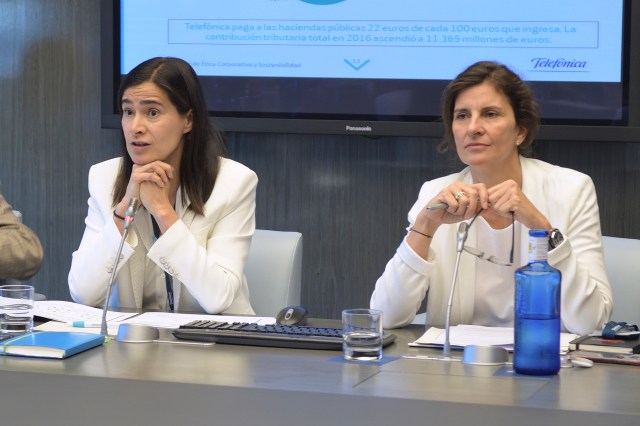
From left to right: Laura Abasolo, Director of Planning, Budgets and Control at Telefónica and Elena Valderrábano, Director of Corporate Ethics and Sustainability at Telefónica 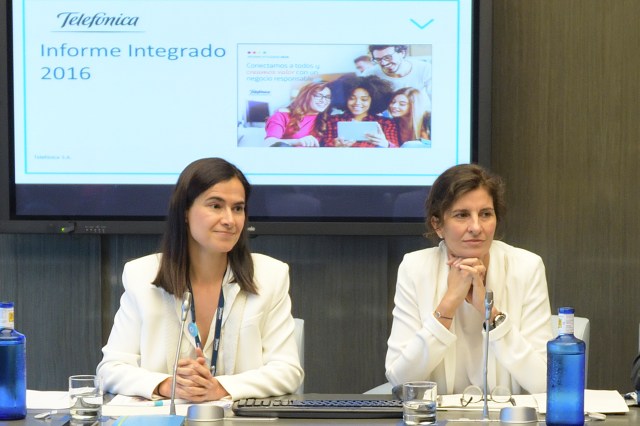
From left to right: Laura Abasolo, Director of Planning, Budgets and Control at Telefónica and Elena Valderrábano, Director of Corporate Ethics and Sustainability at Telefónica
